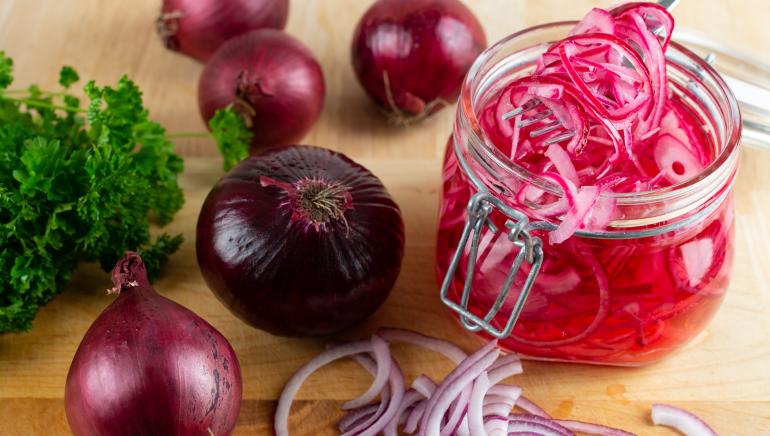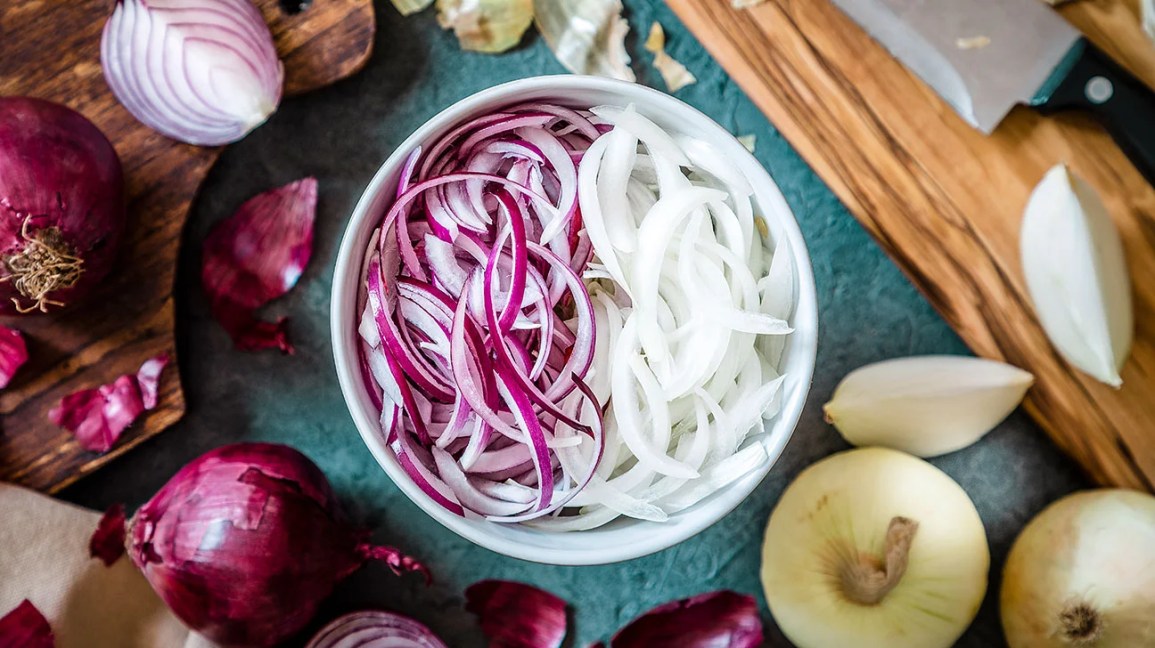Onions, often seen as a humble kitchen staple, possess surprising benefits that extend far beyond adding flavor to our meals. Did you know that onions can actually be a powerful ally for your eye health? Rich in essential nutrients and antioxidants, this vegetable may help protect your vision, soothe eye irritation, and even reduce the risk of certain eye conditions.
Onions contain nutrients and compounds that can benefit your eyes. From vitamins A, C, and E to the potent antioxidant quercetin and essential sulfur compounds, onions offer a range of benefits that support eye health. Adding them in your diet can help protect against oxidative stress, reduce inflammation, and promote overall eye wellness.
As we explore the specific ways onions can nurture your eyes and safeguard your sight, you’ll see why this simple vegetable deserves a special place in your diet. This article will uncover how something as basic as an onion could play a vital role in your eye health, keeping your vision sharp and your eyes protected for the long term. Let’s read further and discover why you should embrace the onion not just for its taste, but for the future of your eye care!
The Nutritional Value of Onions
Onions are packed with essential vitamins and minerals. They contain vitamins A, C, and E, all of which are known to be beneficial for eye health. Vitamin A, in particular, is good for maintaining healthy vision. It plays a vital role in the formation of rhodopsin, a pigment in the retina that helps us see in low light conditions. Without sufficient vitamin A, night vision can be significantly impaired.
Vitamin C acts as an antioxidant, protecting the eyes from damage caused by free radicals. This vitamin also supports the health of blood vessels in the eyes, reducing the risk of developing cataracts and age-related macular degeneration (AMD). Vitamin E works in tandem with vitamin C, providing an additional layer of protection against oxidative stress.
Is Onions Good for the Eyes?

Onions are packed with different essential vitamins, minerals, and certain benefits that makes it beneficial for eye health of humans. Here are the certain benefits onions provides for the human health that you must know about.
1. Quercetin
One of the most noteworthy compounds found in onions is quercetin, a powerful antioxidant. Quercetin has been shown to have anti-inflammatory properties and the ability to combat oxidative stress, both of which are beneficial for eye health. Oxidative stress can lead to cellular damage in the eyes, contributing to conditions like cataracts and AMD.
By neutralizing free radicals, quercetin helps to protect the delicate tissues of the eyes. Additionally, its anti-inflammatory properties can reduce the risk of chronic eye conditions, making onions a valuable addition to a diet aimed at maintaining eye health.
2. Onions provides Sulfur Compounds to the Human Eyes
Onions are rich in sulfur compounds, which are responsible for their distinctive smell and taste. These compounds, such as allyl sulfides and sulf-oxides, have been studied for their health-promoting properties. Sulfur is essential for the production of glutathione, a potent antioxidant that plays a critical role in protecting the lens of the eye from oxidative damage.
Glutathione levels tend to decrease with age, making the eyes more susceptible to cataracts and other degenerative conditions. By including onions in your diet, you can help boost your body’s production of glutathione, thereby supporting overall eye health.
3. Onions Reduces Eye Infections
In traditional medicine, onions have been used to treat various infections, including those affecting the eyes. The antimicrobial properties of onions can help fight off bacteria and viruses that cause eye infections. Applying onion juice or extracts around the eyes, though unconventional, has been a folk remedy for reducing inflammation and infection.
However, it’s essential to exercise caution with such practices, as the pungent nature of onions can cause irritation. Always consult with a healthcare professional before trying home remedies, especially when it involves sensitive areas like the eyes.
4. Preventing Dry Eyes
Dry eyes can be a persistent and uncomfortable condition. Onions, thanks to their sulfur compounds, can stimulate the production of tears. While this is often an unwanted side effect when chopping onions, the increased tear production can be beneficial for individuals with dry eyes. Ensuring adequate hydration and lubrication of the eyes helps maintain comfort and prevents irritation.
5. Eye Health and Blood Sugar Regulation
Maintaining stable blood sugar levels is crucial for overall health, including eye health. High blood sugar levels can damage the blood vessels in the eyes, leading to diabetic retinopathy, a condition that can cause vision loss. Onions have been shown to help regulate blood sugar levels, thanks to their low glycemic index and the presence of compounds like quercetin.
By adding onions into a balanced diet, you can support better blood sugar control, reducing the risk of eye complications associated with diabetes.
Culinary Uses of Onions for Health Benefit

Adding onions into your diet is easy and can be done in various delicious ways. Raw onions can be added to salads and sandwiches for a crunchy, flavorful boost. Cooking onions enhances their sweetness and can be a base for soups, stews, and sautés. The versatility of onions makes them an excellent addition to any meal, ensuring you reap their nutritional benefits regularly.
Choosing the Right Onions
There are several varieties of onions, including red, white, yellow, and sweet onions. Each type offers unique flavors and nutritional benefits. Red onions, for instance, are particularly high in antioxidants, including quercetin. Yellow onions are versatile and commonly used in cooking, while sweet onions have a milder flavor, making them ideal for raw consumption.
Choosing a variety of onions can help you take advantage of the different nutritional profiles they offer, supporting overall health, including your eyes.
Addressing Common Concerns When Cutting Onions
Some might worry about the tear-inducing effects of onions and their potential to irritate the eyes. While it’s true that the sulfur compounds released when cutting onions can cause temporary discomfort, these compounds are also responsible for many of the health benefits onions provide. To minimize irritation, try chilling the onions before cutting or using a sharp knife to reduce the release of irritants.
Onions in Eye Health Research

Recent studies have begun to explore the potential of onions in promoting eye health more scientifically. Research suggests that the antioxidants and anti-inflammatory compounds in onions can play a role in preventing eye diseases. For instance, animal studies have shown that quercetin can reduce the risk of cataract formation.
Human studies are still needed to confirm these findings, but the current evidence supports the idea that including onions in your diet could be beneficial for maintaining healthy eyes.
Practical Tips for Including Onions in Your Diet
To maximize the benefits of onions for your eyes, consider these practical tips:
- Add finely chopped onions to salads for a burst of flavor and nutrition.
- Include onions in your cooking, whether in soups, stews, or stir-fries.
- Experiment with different types of onions to enjoy a variety of tastes and health benefits.
- Use onion powder or dried onions as a convenient alternative in recipes.
Exploring Onion Supplements
For those who find it challenging to include onions in their diet regularly, onion supplements might be an option. These supplements often contain concentrated extracts of onion compounds like quercetin. While they can provide a convenient way to boost your intake of beneficial compounds, it’s always best to get nutrients from whole foods when possible.
Potential Side Effects and Precautions
While onions are generally safe for most people, some individuals may experience digestive discomfort or allergic reactions. If you have a known allergy to onions or other alliums, it’s best to avoid them. Additionally, those with irritable bowel syndrome (IBS) might find that onions exacerbate their symptoms.
Frequently Asked Questions (FAQs)
Here are answers to questions that you might find helpful.
Can eating onions improve eyesight?
Eating onions can indirectly support eye health, but they do not directly improve eyesight. Onions are rich in antioxidants like quercetin, which help protect the eyes from oxidative stress and damage caused by free radicals. While onions can reduce the risk of eye conditions like cataracts and macular degeneration, they cannot instantly enhance your vision. However, adding onions to a balanced diet contributes to overall eye health in the long run.
What nutrients in onions are good for eye health?
Onions contain several nutrients beneficial for eye health, including quercetin, sulfur compounds, and vitamins like Vitamin C. Quercetin, a powerful antioxidant, helps reduce inflammation and oxidative stress in the eyes, while sulfur compounds promote the production of glutathione, which protects the eye’s lens. These nutrients work together to protect against damage and maintain the clarity of your vision.
Can onions help prevent cataracts and other eye diseases?
Yes, onions may help in reducing the risk of cataracts and other eye diseases. The antioxidants found in onions, such as quercetin and sulfur compounds, protect the eyes from free radical damage, which can lead to cataracts and age-related macular degeneration. While onions alone won’t prevent these conditions, they can be a part of a diet that supports long-term eye health.
How do onions help with dry eyes and irritation?
Onions can promote tear production, which helps relieve dry eyes and irritation. When you cut onions, the sulfur compounds they release trigger the production of tears. This can be beneficial for people suffering from dry eye syndrome or who experience occasional eye irritation. However, for chronic dry eyes, it’s important to consult with an eye care professional rather than relying on onions alone.
Are there any side effects of using onions for eye care?
While onions are generally safe to eat, using them directly on the eyes or in homemade remedies can cause irritation and discomfort. The sulfur compounds that promote tears can also cause a burning sensation in the eyes, which may lead to redness and discomfort. It’s always best to use onions as part of your diet rather than applying them directly to the eyes. If you experience persistent eye issues, it’s important to consult a healthcare professional.
Conclusion
Is onion good for the eyes? Yes, Onions, commonly associated with adding flavor to your favorite dishes, are packed with hidden health benefits, particularly for your eyes. They might not be the first food you think of when it comes to eye care, but these humble vegetables are loaded with nutrients like sulfur compounds, flavonoids, and antioxidants that can contribute significantly to maintaining healthy vision.
Whether you enjoy them raw, cooked, or as a supplement, finding ways to include onions into your meals can be a simple yet effective strategy for maintaining healthy eyes. So next time you find yourself chopping onions and shedding a tear, take comfort in knowing that these versatile vegetables are doing your eyes a world of good.
